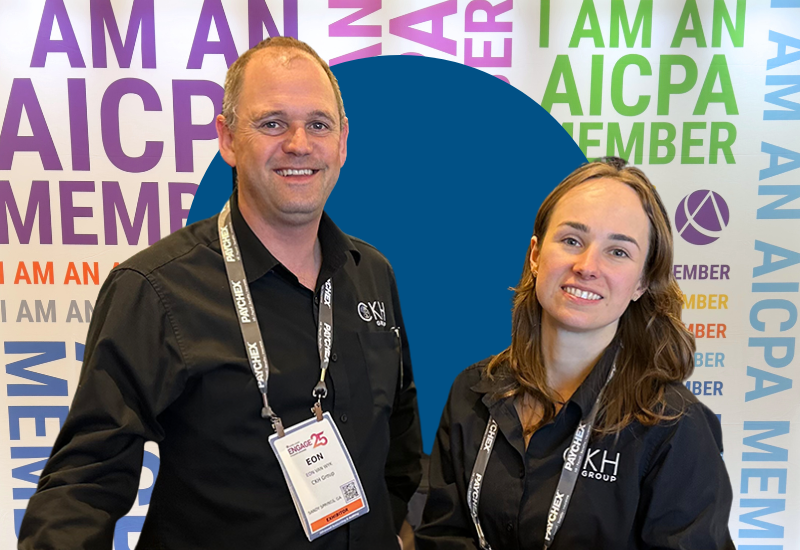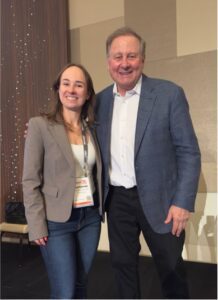5 Key Takeaways from AICPA ENGAGE 2025
- June 17, 2025
- Posted by: CKH Group
- Categories: Financial Tips, Tax tips

What we learned at AICPA Engage 2025: The latest accounting industry updates
 Last week, CKH Group had the privilege of exhibiting at AICPA ENGAGE 2025, the premier event for professionals shaping the future of accounting and finance. Hosted in Las Vegas, this year’s conference brought together leading voices from across the industry to address the evolving role of CPAs in an increasingly complex economic and technological landscape.
Last week, CKH Group had the privilege of exhibiting at AICPA ENGAGE 2025, the premier event for professionals shaping the future of accounting and finance. Hosted in Las Vegas, this year’s conference brought together leading voices from across the industry to address the evolving role of CPAs in an increasingly complex economic and technological landscape.
While at ENGAGE, our CEO Kate Kudrenko and CFO Eon van Wyk connected with hundreds of professionals and attended high-impact sessions from two of the most respected leaders in the field including:
Mark Koziel, CEO of the AICPA and the Association of International Certified Professional Accountants, who is driving modernization and trust in the profession.
Allan Koltin, an M&A expert, consultant, and perennial fixture on Accounting Today’s “Top 100 Most Influential” list, known for his big-picture perspective on firm growth and strategy.
 Meeting distinguished speakers such as Gary Cohn (Vica Chair, IBM), Susan Coffey (CEO of Public Accounting, AICPA & CIMA, Ian Bremmer (President of Eurasia Group), Lexy Kessler (Chair, AICPA), Hillary Salo (Vice Chair, FASB), Dana Peterson (Chief Economist at The Conference Board), and Ben Nemtin (New York Times bestselling author and motivational speaker), offered clarity on where the profession is heading and what firms must do to adapt.
Meeting distinguished speakers such as Gary Cohn (Vica Chair, IBM), Susan Coffey (CEO of Public Accounting, AICPA & CIMA, Ian Bremmer (President of Eurasia Group), Lexy Kessler (Chair, AICPA), Hillary Salo (Vice Chair, FASB), Dana Peterson (Chief Economist at The Conference Board), and Ben Nemtin (New York Times bestselling author and motivational speaker), offered clarity on where the profession is heading and what firms must do to adapt.
With so many experts in one place spanning a range of nine session tracks from taxation and audit leadership to tech, the wealth of knowledge was overflowing by the end of the week.
As always, we want to bring our insight to you, so below we’ve summarized five key takeaways from their presentations at AICPA ENGAGE 2025 that individuals, CPAs, and accounting firms should consider.
1. The Trusted Advisor Role Is Expanding
Mark Koziel stressed that in today’s environment of economic uncertainty, global trade volatility, and tightening regulation, clients aren’t just looking for someone to “do the books” they’re seeking guidance. And those that can go above and beyond in this regard are highly valuable.
“The trusted advisor role has never been more important,” he noted. From ESG strategy and digital asset compliance to new standards for global taxation, CPAs are being called to the front lines of risk management and financial decision-making. And if our crypto tax takeaways from XRP Las Vegas were any indication, new regulations and new types of taxation need more guidance than ever.
To meet this demand, firms must deepen their service offerings and ensure their teams are equipped to handle complex, real-time advisory needs, not just after-the-fact reporting. This is one of the many reasons why CKH Group has expanded into the advisory role: a deep commitment to the success of each of our clients, beyond standard accounting.
2. AI Isn’t the Future, It’s the Present
We saw a recurring theme amongst sessions: artificial intelligence isn’t coming, it’s already here. Koziel cited the 2025 CPA.com State of AI in Accounting Report, which suggests that while 80% of current accounting tasks are being commoditized by AI, the remaining 20% (tasks that require judgment, strategic insight, and human understanding) are becoming exponentially more valuable.
Koltin echoed the urgency: “What got us to the dance won’t keep us at the dance.” Firms must pivot from compliance-heavy models to AI-enabled, insight-driven service lines that deliver real value.
At CKH Group, we’re already implementing data and technology tools that support these AI-led efficiencies. Our team of highly experienced developers work closely with our accountants to build automations, dashboards and AI-powered tools that improve processes and free up our accountants to focus on these “20% tasks” that require their expert strategic insight. We even bring these data and technology services used by our accountants to you.
3. The “Big Beautiful Bill” Could Redefine the Tax Landscape
Another critical and technically rich session at AICPA ENGAGE 2025 came from Robert Keebler, who unpacked the potential accounting consequences of the “Big Beautiful Bill” (BBB): a legislative proposal that would make significant changes to federal tax policy if enacted.
At its core, this bill is designed to permanently enshrine many of the temporary tax provisions created by the Tax Cuts and Jobs Act (TCJA). It also proposes new deductions for overtime pay, tips, car loan interest, and above-the-line charitable giving, alongside revived business incentives like 100% bonus depreciation, R&D expensing, and updated Opportunity Zones. And lastly, it proposed roll backs to clean energy tax credits amongst other things.
So, what does this mean for accounting aside from sweeping changes? Keebler painted a clear picture that now is the time to plan for two tracks: one if the BB passes, and one if it doesn’t.
If the BBB passes, accountants will need to help clients adjust to a more permanent tax landscape. TCJA provisions like lower tax brackets and the 20% pass-through deduction would stay in place, making long-term planning more predictable. New deductions (for tips, car loans, and overtime) create savings opportunities, especially for middle-income earners. Businesses may want to accelerate investments using bonus depreciation and R&D expensing. However, the loss of clean energy incentives will require firms to advise clients swiftly, particularly those who were mid-process on EV or solar projects.
If the BBB doesn’t pass, the end of 2025 will bring significant changes to the current tax landscape. Key provisions from the TCJA like the expanded estate tax exemption, 199A deduction, and relaxed AMT and mortgage interest rules are scheduled to sunset. Accountants should help clients prepare for these shifts by exploring gifting opportunities, reviewing income strategies, and evaluating business structures now.
In both scenarios, 2025 becomes a critical deadline to take advantage of tax strategies before they become unavailable. Keebler’s session made it clear that early preparation remains essential.
4. Mergers, Succession, and Culture Are Colliding
Succession planning was a major theme in Koltin’s talk, especially for firms contemplating upstream mergers. Beyond finances, culture emerged as a major concern. He posed a challenge to firm leaders: Can your culture scale? Are your values built into your growth model? Can a firm maintain its values as it grows or merges?
Koltin posed the “Door #1 vs. Door #2” dilemma: stick with the status quo and hope for the best or make bold moves that require capital and structural changes. Many firms are bypassing both and choosing “Door #3”; merging with like-minded partners to access scale and resources while preserving legacy.
Koltin emphasized that cultural alignment, not just financial synergy, is what makes or breaks these kinds of mergers. Firms must consider not only who they want to become but who they want to become with. As Koltin framed it: “Is there a firm out there whose playbook actually matches yours?”
If you are considering an M&A transaction, CKH Group can also assist when it comes to determining the value and true profitability of your target business through our transaction advisory services including Quality of Earnings reports.
5. The Future of the Profession Is Still About People
 Despite all the talk of AI and capital investment, both Koziel and Koltin grounded their presentations in a core truth: the future of accounting is still about people. Building a culture of belonging, mentoring emerging professionals, and strengthening the CPA pipeline are all strategic imperatives. The profession’s future depends on developing talent, unifying advisory services, and creating firms where people thrive.
Despite all the talk of AI and capital investment, both Koziel and Koltin grounded their presentations in a core truth: the future of accounting is still about people. Building a culture of belonging, mentoring emerging professionals, and strengthening the CPA pipeline are all strategic imperatives. The profession’s future depends on developing talent, unifying advisory services, and creating firms where people thrive.
As Koziel stated, “Without culture, you have an audience, not a community.”
This message aligns with CKH Group’s internal philosophy: that people and purpose drive performance. We are deeply client-focused, and part of that is adapting and growing to meet their needs and the changes in the accounting profession.
One of our core values of ‘shaking the tree’ leans into the idea of always finding new ways to improve processes to give our clients the highest quality of service. Our recent spotlight on data-enhanced audit solutions reinforces that belief; technology is the enabler, not the replacement, for thoughtful, ethical, human decision-making.
Final Thoughts
 AICPA ENGAGE 2025 confirmed what many of us in the profession already feel: the pace of change is accelerating, and the path forward requires both courage and clarity. Whether it’s embracing AI, revisiting firm strategy, or deepening human connection, firms that evolve with intention will lead the next chapter of accounting.
AICPA ENGAGE 2025 confirmed what many of us in the profession already feel: the pace of change is accelerating, and the path forward requires both courage and clarity. Whether it’s embracing AI, revisiting firm strategy, or deepening human connection, firms that evolve with intention will lead the next chapter of accounting.
CKH Group was honored to attend, exhibit, and connect with forward-thinking professionals across the country, and we’re excited to apply these takeaways in our work with clients, partners, and the community at large. If you’re curious about how we can support you, please connect with us online, or reach out to us directly at 1-770-495-9077 or email us at [email protected].
The above article only intends to provide general financial information and is based on open-source facts, it is not designed to provide specific advice or recommendations for any individual. It does not give personalized tax, financial, or other business and professional advice. Before taking any form of action, you should consult a financial professional who understands your particular situation. CKH Group will not be held liable for any harm/errors/claims arising from the articles. Whilst every effort has been taken to ensure the accuracy of the contents, we will not be held accountable for any changes that are beyond our control.
